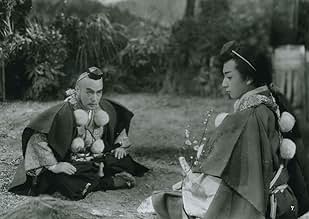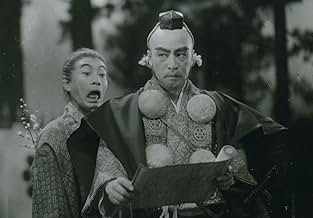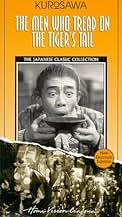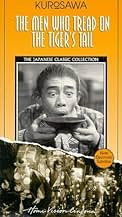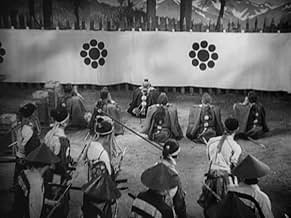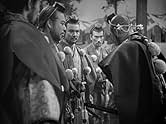Les hommes qui marchèrent sur la queue du tigre
Original title: Tora no o o fumu otoko-tachi
IMDb RATING
6.7/10
4.7K
YOUR RATING
A Japanese general and his men disguise themselves as monks in order to pass an enemy border patrol.A Japanese general and his men disguise themselves as monks in order to pass an enemy border patrol.A Japanese general and his men disguise themselves as monks in order to pass an enemy border patrol.
- Director
- Writers
- Stars
- Director
- Writers
- All cast & crew
- Production, box office & more at IMDbPro
Featured reviews
One can, for the first time, in my opinion, see what Kurosawa could do. He follow a group. of men trying to get through a checkpoint, disguised as priests. Their leader is disguised as a porter and therefore must dishonored to be protected. This is all part of a legend in ancient China and the audiences pretty much knew the story. Kurosawa provides comic relief with the true porter who is an unforgettable character. He is one of those pests that drives one crazy, yet he is so persistent in his efforts to be included. Apparently, historically, things don't bode well for the future but the standoff that occurs as they pretty much risk their lives to get through is quite breathtaking. There are incredible images of the landscape and the use of closeups is vibrant and sharp. The porter's dance at the end is terrific, against a bank of clouds, silhouetted against the sky.
The movie is seemingly based on an event from Japan's past, but it is really Kurosawa's allegory on Japan's condition at the end of World War Two. A prince, estranged from his brother, and six of his loyal retainers wander through the forest. They all look disheveled and hard up. They must cross a barrier manned by officials who are not exactly friendly to them, before they can move on to improving their life. The prince is disguised as a lowly porter and we rarely see his face. his retainers are warriors but are now forced to don monk's robes and indeed in passing through the barrier manned by the unfriendly forces (read American's) the lead monk must read a treatise in which peace is extolled as the reason for their existence. basically, the monks are Japanese elite, the porter is the Japanese public, the prince is the emperor, the barrier officials are the Americans, whose leader is wise and although he knows the truth allows the monks to live. They are many truths within truths here. Indeed, in the end the adviser to the emperor says, "we must move on (read from the feudal system) if we are to survive". a very fine movie, short yet poignant. one can easily see even in this early feature of his that Kurosawa is a master at symbolic imagery. By the way this movie was made in 1945, but not released in Japan until 1952. After watching it, I can see why it was delayed. It would have been extremely painful as a Japanese citizen to watch this in 1945, with their country in shambles around them. highly recommended.
I have watched this several times and enjoyed each viewing. It's a very early Kurosawa, apparently done on a shoestring of a budget. However, we can already see Kurosawa's talents in pacing and setting up shots. Kenichi Enomoto as the porter appears out of place at first with his over the top mannerisms and broad comedy, but he fits into the story and breaks up the slower pace of some of the scenes. For Kurosawa and samurai fans, I think this will be more than just a curiosity. This has an early appearance of Masayuki Mori (the murdered husband in Roshomon) and a fairly early appearance of Takashi Shimura (leader of the seven samurai). I recommend this for the usual suspects.
So, seven outlawed noblemen are.... here we see the roots of THE SEVEN SAMURAI. Except that in an hour and writing by himself, Kurosawa winds up concentrating solely on one of them, Denjirô Ôkôchi.
Kurosawa would later note that he preferred to work with other writers, so that other characters could come to the fore. Anyway, they're trying to get past a barrier and to safety in a time of war. Sounds a bit like THE HIDDEN FORTRESS, doesn't it? According to my reading, all of Toho's actresses had been sent out of Tokyo because of bombing. Otherwise he might have made the other movie in 1945. There's surely a hint of it, when the noblemen they are trying to keep safe is said to look like a girl.
Kurosawa would later note that he preferred to work with other writers, so that other characters could come to the fore. Anyway, they're trying to get past a barrier and to safety in a time of war. Sounds a bit like THE HIDDEN FORTRESS, doesn't it? According to my reading, all of Toho's actresses had been sent out of Tokyo because of bombing. Otherwise he might have made the other movie in 1945. There's surely a hint of it, when the noblemen they are trying to keep safe is said to look like a girl.
Akira Kurosawa was, well, a genius.
This early film is only further proof.
Before he made Rashomon, the Seven Samurai and Ran he made this and it's great.
The cast is fantastic. Kenichi Enomoto is especially great as the porter. That character is brilliant comic relief, which is especially evident in the scene where he attempts to dance.
Jason Biggs doing a stupid dance in American Pie is not funny. Kenichi Enomoto doing a stupid dance in Tora no o wo fumu otokotachi is.
The rest of the cast is great, too.
The characters are wonderful. There's of course the cowardly porter, and the clever character who, pretending to be a monk, has to think quickly and it's fun to watch.
Not only that, there is some very fine music and dialogue in this.
Only problem: Too short. . . but then again, I could say the same about the Seven Samurai and Ran. A great movie is always too short.
Highly recommended.
This early film is only further proof.
Before he made Rashomon, the Seven Samurai and Ran he made this and it's great.
The cast is fantastic. Kenichi Enomoto is especially great as the porter. That character is brilliant comic relief, which is especially evident in the scene where he attempts to dance.
Jason Biggs doing a stupid dance in American Pie is not funny. Kenichi Enomoto doing a stupid dance in Tora no o wo fumu otokotachi is.
The rest of the cast is great, too.
The characters are wonderful. There's of course the cowardly porter, and the clever character who, pretending to be a monk, has to think quickly and it's fun to watch.
Not only that, there is some very fine music and dialogue in this.
Only problem: Too short. . . but then again, I could say the same about the Seven Samurai and Ran. A great movie is always too short.
Highly recommended.
Did you know
- TriviaProduction had to be halted briefly during production of the film as Japan surrendered, bringing an end to the hostilities of World War II. Akira Kurosawa recollected breaking during production to listen to the address by Emperor Hirohito on August 15th, 1945.
- ConnectionsFeatured in Great Performances: Kurosawa (2000)
- How long is The Men Who Tread on the Tiger's Tail?Powered by Alexa
Details
- Release date
- Country of origin
- Language
- Also known as
- Qui marche sur la queue du tigre...
- Filming locations
- Toho Studios, Tokyo, Japan(Studio)
- Production company
- See more company credits at IMDbPro
- Runtime
- 59m
- Color
- Sound mix
- Aspect ratio
- 1.37 : 1
Contribute to this page
Suggest an edit or add missing content

